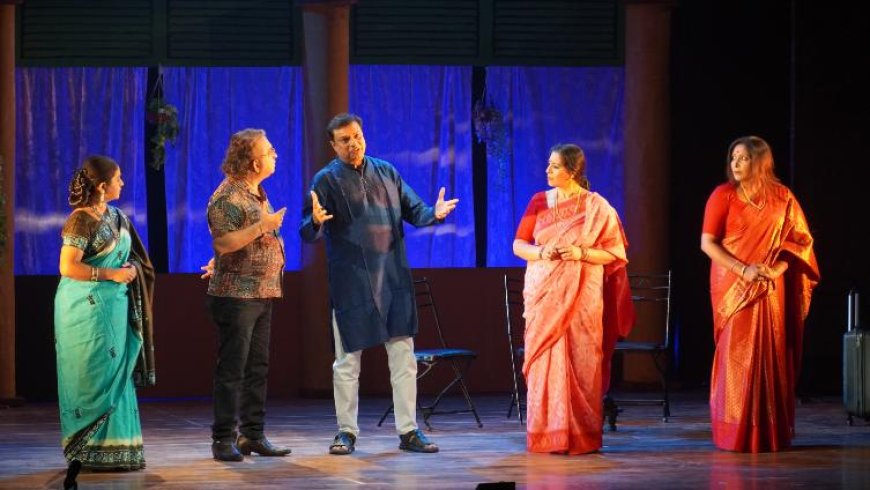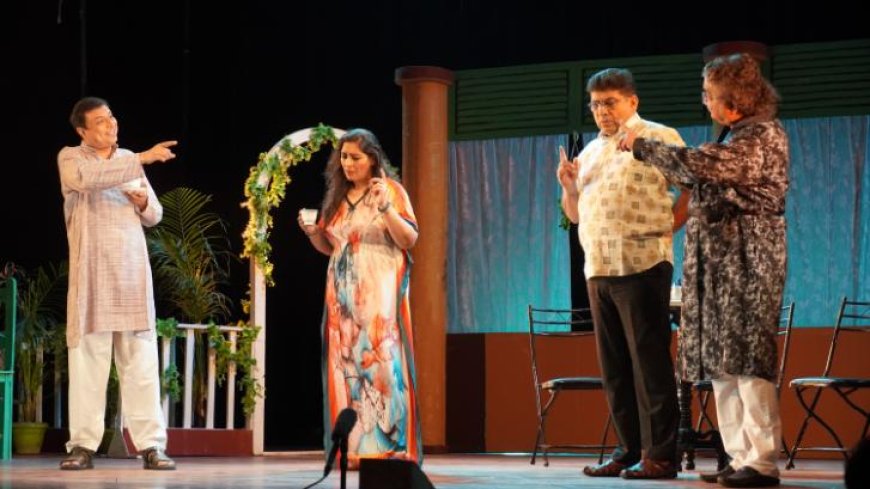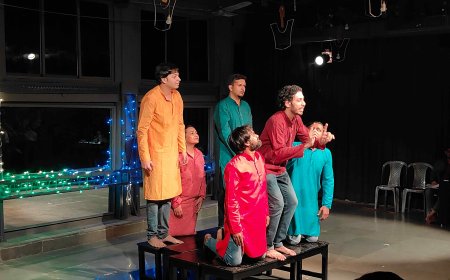Play Review: BADAL SARKAR’S JODI AAR EKBAR
Dr. Shoma A. Chatterji provides a thoughtful review of a Badal Sarkar play titled JODI AAR EKBAAR in celebration of his centenary which falls in July this year.
Recently, Dus Yaari, a lesser known theatre group in Kolkata, staged a proscenium performance of Badal Sarkar’s play Jodi Aar Ek Baar at Sujata Sadan in south Kolkata. Jodi Aar Ek Baar is perhaps one of the few proscenium plays Sircar wrote and directed in his earlier years in theatre. 2025 marks the centenary of Badal Sarkar who turned the very concept of theatre as entertainment to theatre as Life itself, which broke every rule in the book of traditional proscenium theatre which he chose to call “Third Theatre.”
Suchita Ray Choudhury, an actress in her own right, chose to direct the play as a tribute to Sircar on his centenary year. The play, first staged in 1976, explores human desire and disillusionment. It's part of Sircar's work for the proscenium theatre, which he later critiqued for its limitations, leading him to found the Third Theatre which deliberately broke away from every rule of proscenium theatre to establish its own ‘free’ theatre which extended the parameters of theatre by bringing it out on the streets, minus make-up, costume, sets, microphone, loudspeakers and turn the actor’s body into an all- comprehensive performance unto itself.
But Jodi Aar Ek Baar is different though it has the sparks of a genius who wrote, thought and acted differently. This play did not precede Third Theatre but was almost aligned to his Third Theatre timeline. So, the play we watched, had traces of his genius in terms of the misconceptions we live within, of dreaming of a happier life with a different partner when the present one is just right.
Says Ray Choudhury about the play, “The simple message conveyed by the play, that is often forgotten, is as true today as when the play was written. People always feel that “the grass is greener on the other side”, but if indeed one gets a second chance to live that desired life, the experience might be very different from the one expected.” The English name of the play decided by the group is “If Only Once More” which is a literal translation of the original Bengali title.
The play has a constant narrator and in this presentation, the actor who plays the (Piyas Chakrabarti) narrator also becomes a “jin”, a wish-fulfilling spirit who plays around with the five characters who have arrived at a beach resort on a holiday. They did not know each other but along the way, the two married couples and a single woman become holidaying companions in a manner of speaking.
Two couples and a single, working woman are all guests at a seaside guest-house. Their conversations reveal that each is unhappy with his/her partner or the lack of one and their lament that life would have been wonderfully different had they chosen differently. Then, unlike the later Badal Sarkar creations, magic happens. The couples find with a swish of the imaginary wand, the senior ‘jin’ changes the partners for them to discover whether they are happier with the switch or not. Of course they are not. The director uses a lot of tongue-in-cheek satire and humour to drive the point home both to the audience as well as to the characters that they were better off before than they are now with their partners.
The older of the two couples Karuna (Monikuntala Rudra) and Ratikanta Sanyal (Rajib Lahiri) discover to their shock, that the magic chemistry that worked between them is missing. Karuna mourns the loss of freedom and individuality after marriage, and her husband Ratikanta takes her consequent dispiritedness and lack of education as a damper in the marriage. He is charmed instead by the bold, erudite, independent and single Bonolata (Navanita Chakrabarti).
Atasi (Varsha Dutta), a rich man’s daughter, is married to a struggling writer Sanjay Ghosh (Arindam Mukhopadhyay). Atasi discovers that the very literary talents that first pulled her to Sanjay was a misnomer and that Sanjay was a failed writer pushing the couple to lead an ordinary life minus the luxuries she had expected and was used to. In the changed circumstances engineered by the older jin (Piyas Chakrabarti), Karuna, who envied the single Bonolota’s freedom, is made ‘single’ while Bonolata who was kind of jealous of Karuna, gets hers while Atasi finds that she happens to be the spouse the guest-house’s help Brijlal (Arup Kumar Mitra), who is now a moneyed businessman. Sanjay is a published author, successful too but has turned into an alcoholic. So, even within their changed relationships, they remain unhappy, perhaps much more than they were in their previous relationships.
The manager of the guest-house Satyasindhu Seth (Kausik Maitra) is the sutradhar (narrator), who along with Buddha Jinn (Piyas Chakrabarti), a local genie, acts as a catalyst. When the two couples, the single woman, the narrator-cum-manager find that their temporary ‘roles’ have been reversed back to their original status, everyone heaves a sigh of relief.
The women in the play are given a lot of performance space but in some long scenes, they tend to stand facing the audience while conversing among themselves which appear both monotonous and static. The play succeeds in engineering a happy and cohesive climax with the two ‘jins’ the Buddha and the small one when everyone is restored to their former lives and the relationships live happily ever after or so we are given to think.
The play, distinguished by the uninhibited and somewhat unprofessional actors performing organically on stage, succeeds in bringing this surrealistic creation of a segment of life. It is a metaphor on marriage, man-woman relationships and also, on the inherent loneliness of the single woman who, earlier, was more than flattered by the attention the men were giving her including the manager of the guest house.
Kausik Maitra as Satyasindhu, the manager, and Piyas Chakrabarti as Buddha Jin are brilliant, managing to hold the complex reins of this difficult and challenging play together from beginning to end. It is a single-set play with the suggestion of a park and a beach beyond the stage where the characters repair to now and then. The music is well chosen to fit into the mood and ambience of the performance. Chopping off around 15 minutes from this long performance would have brought about a greater impact among the audience.
Says director Roy Choudhury, “I have always been fascinated by the manner in which Badal Sircar has delved deep into the troubled psyche of these women coming from widely different backgrounds. His sense of humour is never too far away even when dealing with darker subjects. No wonder it still remains one of the most entertaining play in the Badal Sarkar repertoire.”
*****
What's Your Reaction?

































































